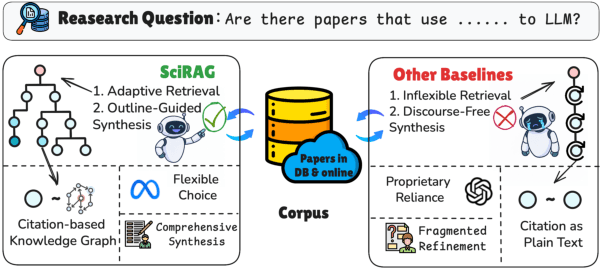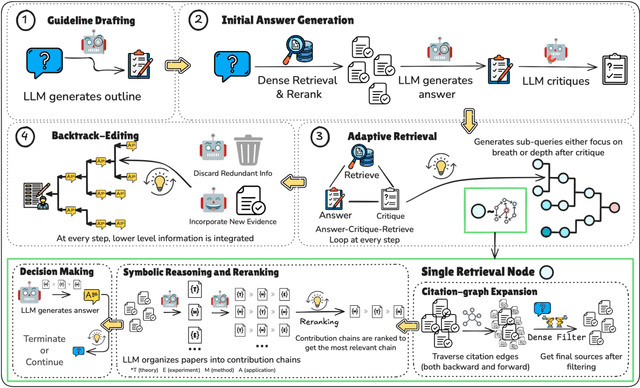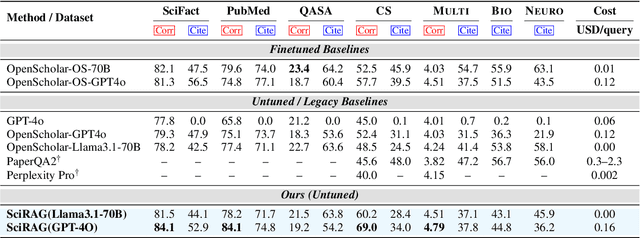Arman Cohan
ResearchGym: Evaluating Language Model Agents on Real-World AI Research
Feb 16, 2026Abstract:We introduce ResearchGym, a benchmark and execution environment for evaluating AI agents on end-to-end research. To instantiate this, we repurpose five oral and spotlight papers from ICML, ICLR, and ACL. From each paper's repository, we preserve the datasets, evaluation harness, and baseline implementations but withhold the paper's proposed method. This results in five containerized task environments comprising 39 sub-tasks in total. Within each environment, agents must propose novel hypotheses, run experiments, and attempt to surpass strong human baselines on the paper's metrics. In a controlled evaluation of an agent powered by GPT-5, we observe a sharp capability--reliability gap. The agent improves over the provided baselines from the repository in just 1 of 15 evaluations (6.7%) by 11.5%, and completes only 26.5% of sub-tasks on average. We identify recurring long-horizon failure modes, including impatience, poor time and resource management, overconfidence in weak hypotheses, difficulty coordinating parallel experiments, and hard limits from context length. Yet in a single run, the agent surpasses the solution of an ICML 2025 Spotlight task, indicating that frontier agents can occasionally reach state-of-the-art performance, but do so unreliably. We additionally evaluate proprietary agent scaffolds including Claude Code (Opus-4.5) and Codex (GPT-5.2) which display a similar gap. ResearchGym provides infrastructure for systematic evaluation and analysis of autonomous agents on closed-loop research.
ANCHOR: Branch-Point Data Generation for GUI Agents
Feb 06, 2026Abstract:End-to-end GUI agents for real desktop environments require large amounts of high-quality interaction data, yet collecting human demonstrations is expensive and existing synthetic pipelines often suffer from limited task diversity or noisy, goal-drifting trajectories. We present a trajectory expansion framework Anchor that bootstraps scalable desktop supervision from a small set of verified seed demonstrations. Starting from each seed, we identify branch points that correspond to meaningful state changes and propose new, state-grounded task variants conditioned on the current GUI context. An executing agent then follows the proposed instructions to generate new trajectories, while a verifier enforces task completion via state-aware checks and trajectory-level consistency. To improve supervision quality, we further apply task-conditioned step-level filtering to remove ungrounded actions and denoise post-branch segments to maintain coherent intent. Experiments on standard desktop benchmarks, OSWorld and WindowsAgentArena, show that models fine-tuned on our expanded corpus achieve consistent improvements over zero-shot agents and representative synthesis baselines, and generalize across applications and operating systems.
SAGE: Benchmarking and Improving Retrieval for Deep Research Agents
Feb 05, 2026Abstract:Deep research agents have emerged as powerful systems for addressing complex queries. Meanwhile, LLM-based retrievers have demonstrated strong capability in following instructions or reasoning. This raises a critical question: can LLM-based retrievers effectively contribute to deep research agent workflows? To investigate this, we introduce SAGE, a benchmark for scientific literature retrieval comprising 1,200 queries across four scientific domains, with a 200,000 paper retrieval corpus.We evaluate six deep research agents and find that all systems struggle with reasoning-intensive retrieval. Using DR Tulu as backbone, we further compare BM25 and LLM-based retrievers (i.e., ReasonIR and gte-Qwen2-7B-instruct) as alternative search tools. Surprisingly, BM25 significantly outperforms LLM-based retrievers by approximately 30%, as existing agents generate keyword-oriented sub-queries. To improve performance, we propose a corpus-level test-time scaling framework that uses LLMs to augment documents with metadata and keywords, making retrieval easier for off-the-shelf retrievers. This yields 8% and 2% gains on short-form and open-ended questions, respectively.
Patient-Similarity Cohort Reasoning in Clinical Text-to-SQL
Jan 14, 2026Abstract:Real-world clinical text-to-SQL requires reasoning over heterogeneous EHR tables, temporal windows, and patient-similarity cohorts to produce executable queries. We introduce CLINSQL, a benchmark of 633 expert-annotated tasks on MIMIC-IV v3.1 that demands multi-table joins, clinically meaningful filters, and executable SQL. Solving CLINSQL entails navigating schema metadata and clinical coding systems, handling long contexts, and composing multi-step queries beyond traditional text-to-SQL. We evaluate 22 proprietary and open-source models under Chain-of-Thought self-refinement and use rubric-based SQL analysis with execution checks that prioritize critical clinical requirements. Despite recent advances, performance remains far from clinical reliability: on the test set, GPT-5-mini attains 74.7% execution score, DeepSeek-R1 leads open-source at 69.2% and Gemini-2.5-Pro drops from 85.5% on Easy to 67.2% on Hard. Progress on CLINSQL marks tangible advances toward clinically reliable text-to-SQL for real-world EHR analytics.
MedTutor: A Retrieval-Augmented LLM System for Case-Based Medical Education
Jan 11, 2026Abstract:The learning process for medical residents presents significant challenges, demanding both the ability to interpret complex case reports and the rapid acquisition of accurate medical knowledge from reliable sources. Residents typically study case reports and engage in discussions with peers and mentors, but finding relevant educational materials and evidence to support their learning from these cases is often time-consuming and challenging. To address this, we introduce MedTutor, a novel system designed to augment resident training by automatically generating evidence-based educational content and multiple-choice questions from clinical case reports. MedTutor leverages a Retrieval-Augmented Generation (RAG) pipeline that takes clinical case reports as input and produces targeted educational materials. The system's architecture features a hybrid retrieval mechanism that synergistically queries a local knowledge base of medical textbooks and academic literature (using PubMed, Semantic Scholar APIs) for the latest related research, ensuring the generated content is both foundationally sound and current. The retrieved evidence is filtered and ordered using a state-of-the-art reranking model and then an LLM generates the final long-form output describing the main educational content regarding the case-report. We conduct a rigorous evaluation of the system. First, three radiologists assessed the quality of outputs, finding them to be of high clinical and educational value. Second, we perform a large scale evaluation using an LLM-as-a Judge to understand if LLMs can be used to evaluate the output of the system. Our analysis using correlation between LLMs outputs and human expert judgments reveals a moderate alignment and highlights the continued necessity of expert oversight.
* Accepted to EMNLP 2025 (System Demonstrations)
SciRAG: Adaptive, Citation-Aware, and Outline-Guided Retrieval and Synthesis for Scientific Literature
Nov 18, 2025



Abstract:The accelerating growth of scientific publications has intensified the need for scalable, trustworthy systems to synthesize knowledge across diverse literature. While recent retrieval-augmented generation (RAG) methods have improved access to scientific information, they often overlook citation graph structure, adapt poorly to complex queries, and yield fragmented, hard-to-verify syntheses. We introduce SciRAG, an open-source framework for scientific literature exploration that addresses these gaps through three key innovations: (1) adaptive retrieval that flexibly alternates between sequential and parallel evidence gathering; (2) citation-aware symbolic reasoning that leverages citation graphs to organize and filter supporting documents; and (3) outline-guided synthesis that plans, critiques, and refines answers to ensure coherence and transparent attribution. Extensive experiments across multiple benchmarks such as QASA and ScholarQA demonstrate that SciRAG outperforms prior systems in factual accuracy and synthesis quality, establishing a new foundation for reliable, large-scale scientific knowledge aggregation.
AlphaResearch: Accelerating New Algorithm Discovery with Language Models
Nov 11, 2025Abstract:Large language models have made significant progress in complex but easy-to-verify problems, yet they still struggle with discovering the unknown. In this paper, we present \textbf{AlphaResearch}, an autonomous research agent designed to discover new algorithms on open-ended problems. To synergize the feasibility and innovation of the discovery process, we construct a novel dual research environment by combining the execution-based verify and simulated real-world peer review environment. AlphaResearch discovers new algorithm by iteratively running the following steps: (1) propose new ideas (2) verify the ideas in the dual research environment (3) optimize the research proposals for better performance. To promote a transparent evaluation process, we construct \textbf{AlphaResearchComp}, a new evaluation benchmark that includes an eight open-ended algorithmic problems competition, with each problem carefully curated and verified through executable pipelines, objective metrics, and reproducibility checks. AlphaResearch gets a 2/8 win rate in head-to-head comparison with human researchers, demonstrate the possibility of accelerating algorithm discovery with LLMs. Notably, the algorithm discovered by AlphaResearch on the \emph{``packing circles''} problem achieves the best-of-known performance, surpassing the results of human researchers and strong baselines from recent work (e.g., AlphaEvolve). Additionally, we conduct a comprehensive analysis of the remaining challenges of the 6/8 failure cases, providing valuable insights for future research.
Rethinking Retrieval-Augmented Generation for Medicine: A Large-Scale, Systematic Expert Evaluation and Practical Insights
Nov 10, 2025Abstract:Large language models (LLMs) are transforming the landscape of medicine, yet two fundamental challenges persist: keeping up with rapidly evolving medical knowledge and providing verifiable, evidence-grounded reasoning. Retrieval-augmented generation (RAG) has been widely adopted to address these limitations by supplementing model outputs with retrieved evidence. However, whether RAG reliably achieves these goals remains unclear. Here, we present the most comprehensive expert evaluation of RAG in medicine to date. Eighteen medical experts contributed a total of 80,502 annotations, assessing 800 model outputs generated by GPT-4o and Llama-3.1-8B across 200 real-world patient and USMLE-style queries. We systematically decomposed the RAG pipeline into three components: (i) evidence retrieval (relevance of retrieved passages), (ii) evidence selection (accuracy of evidence usage), and (iii) response generation (factuality and completeness of outputs). Contrary to expectation, standard RAG often degraded performance: only 22% of top-16 passages were relevant, evidence selection remained weak (precision 41-43%, recall 27-49%), and factuality and completeness dropped by up to 6% and 5%, respectively, compared with non-RAG variants. Retrieval and evidence selection remain key failure points for the model, contributing to the overall performance drop. We further show that simple yet effective strategies, including evidence filtering and query reformulation, substantially mitigate these issues, improving performance on MedMCQA and MedXpertQA by up to 12% and 8.2%, respectively. These findings call for re-examining RAG's role in medicine and highlight the importance of stage-aware evaluation and deliberate system design for reliable medical LLM applications.
MRMR: A Realistic and Expert-Level Multidisciplinary Benchmark for Reasoning-Intensive Multimodal Retrieval
Oct 10, 2025Abstract:We introduce MRMR, the first expert-level multidisciplinary multimodal retrieval benchmark requiring intensive reasoning. MRMR contains 1,502 queries spanning 23 domains, with positive documents carefully verified by human experts. Compared to prior benchmarks, MRMR introduces three key advancements. First, it challenges retrieval systems across diverse areas of expertise, enabling fine-grained model comparison across domains. Second, queries are reasoning-intensive, with images requiring deeper interpretation such as diagnosing microscopic slides. We further introduce Contradiction Retrieval, a novel task requiring models to identify conflicting concepts. Finally, queries and documents are constructed as image-text interleaved sequences. Unlike earlier benchmarks restricted to single images or unimodal documents, MRMR offers a realistic setting with multi-image queries and mixed-modality corpus documents. We conduct an extensive evaluation of 4 categories of multimodal retrieval systems and 14 frontier models on MRMR. The text embedding model Qwen3-Embedding with LLM-generated image captions achieves the highest performance, highlighting substantial room for improving multimodal retrieval models. Although latest multimodal models such as Ops-MM-Embedding perform competitively on expert-domain queries, they fall short on reasoning-intensive tasks. We believe that MRMR paves the way for advancing multimodal retrieval in more realistic and challenging scenarios.
MSRS: Evaluating Multi-Source Retrieval-Augmented Generation
Aug 28, 2025Abstract:Retrieval-augmented systems are typically evaluated in settings where information required to answer the query can be found within a single source or the answer is short-form or factoid-based. However, many real-world applications demand the ability to integrate and summarize information scattered across multiple sources, where no single source is sufficient to respond to the user's question. In such settings, the retrieval component of a RAG pipeline must recognize a variety of relevance signals, and the generation component must connect and synthesize information across multiple sources. We present a scalable framework for constructing evaluation benchmarks that challenge RAG systems to integrate information across distinct sources and generate long-form responses. Using our framework, we build two new benchmarks on Multi-Source Retrieval and Synthesis: MSRS-Story and MSRS-Meet, representing narrative synthesis and summarization tasks, respectively, that require retrieval from large collections. Our extensive experiments with various RAG pipelines -- including sparse and dense retrievers combined with frontier LLMs -- reveal that generation quality is highly dependent on retrieval effectiveness, which varies greatly by task. While multi-source synthesis proves challenging even in an oracle retrieval setting, we find that reasoning models significantly outperform standard LLMs at this distinct step.
 Add to Chrome
Add to Chrome Add to Firefox
Add to Firefox Add to Edge
Add to Edge